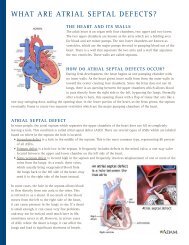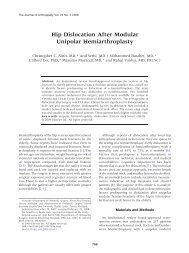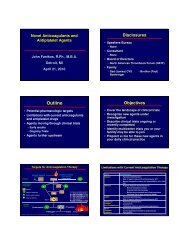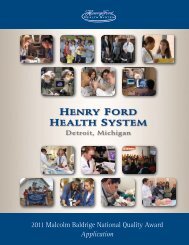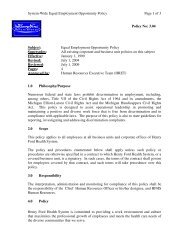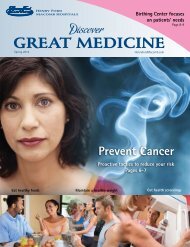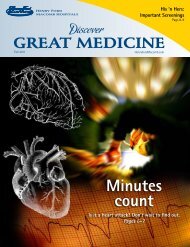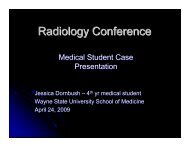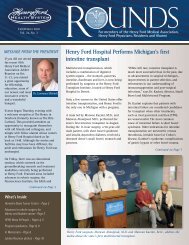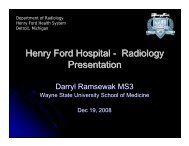Summer 2012 - Henry Ford Health System
Summer 2012 - Henry Ford Health System
Summer 2012 - Henry Ford Health System
- No tags were found...
Create successful ePaper yourself
Turn your PDF publications into a flip-book with our unique Google optimized e-Paper software.
<strong>Summer</strong> <strong>2012</strong>Vol. 26, No. 2For members of the <strong>Henry</strong> <strong>Ford</strong> Medical Association,<strong>Henry</strong> <strong>Ford</strong> Physicians, Residents and AlumniMESSAGE FROM THE PRESIDENTIn this issue, wecelebrate andrecognize ourinnovative andthriving medicaleducation programat <strong>Henry</strong> <strong>Ford</strong>Hospital. Havingbeen trained at<strong>Henry</strong> <strong>Ford</strong> Hospital,including a year as Lawrence Mitchell, M.D.chief resident, andserving in the role ofan educator, I am very familiar with theexcellence of our programs.As a health system dedicated to fosteringthe knowledge and careers of up-andcomingdoctors, <strong>Henry</strong> <strong>Ford</strong> providesmedical students with the opportunityto polish their skills in one of our manymedical education programs. With morethan 600 medical students, 500 residentsand 150 fellows each year, <strong>Henry</strong> <strong>Ford</strong>is one of the largest medical education,training, and teaching centers in thenation. Training at <strong>Henry</strong> <strong>Ford</strong> providesresidents and fellows the opportunity toserve the diverse population of Detroitand its surrounding suburbs. Thisunique experience has caused more than30 percent of <strong>Henry</strong> <strong>Ford</strong> trainees tocontinue their medical careers in the stateof Michigan.What’s InsideContinued on Page 7<strong>Henry</strong> <strong>Ford</strong> Physician Network - Page 2Multicultural Dermatology - Page 3HFMG People - Page 4Research Spotlight - Page 6In Memoriam - Page 8Outstanding Resident Awardsand Graduate List - Pages 9-11TEAM APPROACH AT HENRY FORD TAKESON AVMS AND ANEURYSMS<strong>Henry</strong> <strong>Ford</strong>’s Cerebrovascular Surgeryprogram brings together a team ofspecialists that include neurosurgeons,neurologists, endovascular radiologists,an endovascular surgeon, radiationoncologists and neurointensivists tomanage complex conditions such ascerebral aneurysm and arteriovenousmalformations (AVMs).The <strong>System</strong>’s Cerebrovascular Surgeryprogram has been in operation formore than 30 years and most recently,expanded to <strong>Henry</strong> <strong>Ford</strong> West BloomfieldHospital.Ghaus Malik, M.D., vice chair of theDepartment of Neurosurgery, <strong>Henry</strong><strong>Ford</strong> Neuroscience Institute; director<strong>Henry</strong> <strong>Ford</strong> neurosurgeon, Ghaus Malik,M.D., leads the way with innovativetechniques to treat AVMs and aneurysms.of Cerebrovascular Surgery, and codirectorof the Stroke Program, leadsthe Cerebrovascular Surgery program at<strong>Henry</strong> <strong>Ford</strong> <strong>Health</strong> <strong>System</strong>.“<strong>Henry</strong> <strong>Ford</strong>’s program offers anintegrated and coordinated approach topatient care and condition management.Members of our team come together dailyto discuss patients and make decisions fortheir care. Few institutions can offer sucha complete complement of specialistsand individualized level of care for everypatient,” says Dr. Malik.Collaboration and close communicationalso are achieved through frequent formalmeetings of the Neurovascular andAVM boards. The Neurovascular boardincludes neuroendovascular specialists,stroke neurologists, emergency medicinespecialists, cerebrovascular neurosurgeonsand stroke nurses. The AVM board ismade up of neuroendovascular specialists,cerebrovascular neurosurgeons, strokeneurologists, diagnostic neuroradiologistsand radiation oncologists.<strong>Henry</strong> <strong>Ford</strong> is one of the largest, mostexperienced institutions for treatmentof AVMs and aneurysms in the UnitedStates and the world. AVMs affect lessthan 1 percent of the U.S. population,and approximately 10 percent do notsurvive an initial rupture. <strong>Henry</strong> <strong>Ford</strong>has evaluated 1,350 patients withcerebral vascular malformations, andtreated 544 patients with arteriovenousmalformations using microsurgery and/or multimodality therapy. More than200 patients with other malformationsincluding cavernous, dural or spinal, havebeen treated with excellent outcomes.Similarly, cerebral aneurysm affectsContinued on Page 5
CLINICALLY INTEGRATED NETWORKS SEEK TO IMPROVEQUALITY AND OUTCOMESThe <strong>Henry</strong> <strong>Ford</strong> PhysicianNetwork (HFPN) is based on theidea that greater collaborationand shared accountability amongprivate practitioners, the <strong>Henry</strong><strong>Ford</strong> Medical Group, <strong>Henry</strong> <strong>Ford</strong><strong>Health</strong> <strong>System</strong> hospital-employeddoctors, and <strong>Henry</strong> <strong>Ford</strong> <strong>Health</strong><strong>System</strong> hospitals will create betteroutcomes for southeast Michiganpatients. The HFPN is a ClinicallyIntegrated Network (CIN), andcreates synergy among almost2,000 physicians in a definednetwork. This ultimately improvesquality and efficiency and controlshealth care costs. Physician-drivenquality initiatives demonstratevalue to payers and employersthrough performance measurementand enhanced accountability.Recently, a Rounds editor hadthe opportunity to sit down withCharles Kelly, M.D., president andCEO of the <strong>Henry</strong> <strong>Ford</strong> PhysicianNetwork, to discuss the initiative.Rounds: What is key to aphysician’s success within aClinically Integrated Network?Kelly: One key to success isa willingness to share andbe transparent with qualityperformance data. As part of aCIN, you will code and submitdata in what was previouslylimited to your office setting. Yourperformance will be measuredagainst projected outcomes thenetwork has set to define highperformance. The future is all aboutvalue-based, not volume-based,care. The CIN brings the highestvalue to the marketplace and wemust be willing to share data thatdemonstrates our effectiveness andsuccess.Rounds: What is required ofphysicians who join the CIN?Kelly: The CIN doesn’t require amembership fee to join or stay in,but it does require a commitmentof time from you and your staff tocomplete training before you canjump onto the CIN informationtechnology system. You and youroffice staff collect and enter patientdata into the computer program tomeasure outcomes. Documentingis the mechanism that allows youto qualify for pay-for-performanceincentives. The system allowsyou to see for yourself whereopportunities lie for improvementand to identify where you aredoing well.Rounds: What are the advantagesfor patients?Kelly: When you become part ofa CIN, your patients can expectthe best in quality outcomes andwill recognize that you are makingactionable steps in their healthcare plan. The emphasis is onprevention and control of chronicdisease, and patients are involvedin designing their care plans.Patients will have easier accessto their own health informationand will have additional channelsfor communicating with theirprovider, such as email. We hearfrom patients that they feel more“heard” and appreciate a moreindividualized approach to healthand health care.Rounds: Is joining the HFPN anexclusive arrangement?Kelly: We don’t require exclusivity,but you may find some payers,Charles Kelly, M.D.such as Medicare, do. Beneficiariescan only be leveraged in onearrangement. For example, youcan’t use your patient populationas part of a contract with the HFPNand then with another ACO in adifferent plan. Payers may requireyou to make a decision to be in onenetwork only. To find out more about the<strong>Henry</strong> <strong>Ford</strong> Physician Network, call(313) 874-1466 or log on towww.henryfordphysiciannetwork.com.2
MULTICULTURAL DERMATOLOGY CENTER ADDRESSESUNIQUE DERMATOLOGIC NEEDSPatients of color often have uniqueskin and hair care needs, and requirehighly specialized treatment tomanage their conditions. <strong>Henry</strong> <strong>Ford</strong>’sMulticultural Dermatology Center,established in 2007, is the only centerof its kind in Michigan and one ofless than 10 in the nation.According to <strong>Henry</strong> Lim, M.D.,chair, <strong>Henry</strong> <strong>Ford</strong> Department ofDermatology, “Patients of colorpresent differently with their skinproblems, and their skin reactsdifferently to medical and surgicaltreatments. We provide state-ofthe-artpatient care, educate the nextgeneration of dermatologists on theircare, and perform research on diseasesaffecting people of color. The Center isin a unique position to not only treatthese skin issues, but through clinicalresearch, develop new and effectivetreatment options, then bring them toour patients.”Ongoing clinical research and clinicaltrials with newer medications areunder way at the Center, and sometreatments are offered at no cost topatients taking part in clinical trials.the Melanocyte KeratinocyteTransplant Procedure (MKTP).“In MKTP, melanocytes fromthe patient’s own donor skinare used to repigment affectedareas. In a study at our Center,twenty-three patients regainedon average 45 percent oftheir natural skin color. Tenpatients with a specific type ofvitiligo regained on average65 percent of their skin color,”says Dr. Lim.Follicular Disorder ClinicThis clinic is designed forpatients with hair issuescommonly affecting African-Americans. One exampleis razor bumps on the faceand neck in men. Another ishidradenitis suppurativa, achronic skin inflammationthat causes tender lesionsin areas around sebaceousglands and hair follicles,such as the underarms andgroin. The clinic is usinglaser to successfully treat thispersistent condition.<strong>Henry</strong> Lim, M.D., chair, <strong>Henry</strong> <strong>Ford</strong>Department of Dermatology.Although all medical and cosmeticdermatology needs are addressed atthe Center, these specific areas of needare managed in the Center throughthree clinics:Vitiligo ClinicVitiligo affects 1-2 percent of thepopulation and causes pigment lossin the skin and hair, creating irregularwhite patches of skin. The disease hassignificant social and psychologicalimpacts on patients. Several treatmentoptions are available, whichinclude medications, light therapy,depigmentation and surgery, as wellas a support group. <strong>Henry</strong> <strong>Ford</strong> is theonly site in the nation that performsClinic for Hair Issues affectingAfrican American WomenTreatment and research focuses onhair loss, prevention of loss, and haircare for African-American women.Locations and ReferralA team of dermatologists specializingin skin and hair care for patients ofcolor are available at three <strong>Henry</strong><strong>Ford</strong> locations:• New Center One, 8th Floor, Detroit• <strong>Henry</strong> <strong>Ford</strong> Medical Center –Farmington Road, West Bloomfield• <strong>Henry</strong> <strong>Ford</strong> Medical Center – <strong>Ford</strong>Road, Dearborn (beginning July<strong>2012</strong>)“We offer solutions not usuallyavailable or practiced in atypical dermatologist’s or familypractitioner’s office,” says Dr. Lim.“Patients experiencing skin and hairissues suffer from self-esteem andconfidence issues, and may not beaware that specialized treatment isavailable locally.” Appointments are generally availablewithin two to three weeks. To refer apatient, call 1-877-434-7470.3
HENRY FORD HOSPITAL NAMES DIRECTOR OF NEWSTRUCTURAL HEART DISEASE PROGRAMWilliam W. O’Neill, M.D., has beenappointed medical director of thenew Center for Structural HeartDisease at <strong>Henry</strong> <strong>Ford</strong> Hospital.Dr. O’Neill is an internationallyrecognized leader in interventionalcardiology and research in newtechniques to diagnose and treatheart disease. He pioneered the useof angioplasty for treatment of heartattacks, which is now the mainstaytherapy throughout the world. He hasbeen working on new catheter-basedtreatments of structural heart disease,and performed the first aortic valvereplacement through a catheter in theU.S. in 2005.“With Dr. William O’Neill’sappointment, <strong>Henry</strong> <strong>Ford</strong> Hospitaland Medical Group will capitalize onits longstanding research expertiseand team approach to develop aworld-class Center for StructuralHeart Disease. He is the perfectchoice to lead the way,” says JohnPopovich Jr., M.D., president andCEO, <strong>Henry</strong> <strong>Ford</strong> Hospital.Dr. O’Neill has been a leader inacademic and teaching hospitalsfor nearly 30 years, and to date, anauthor of more than 300 hundredpeer-reviewed articles and abstractspublished in medical literature.He was a founding member of theAmerican Board of Internal Medicineinterventional cardiology board,which certifies all interventionalcardiologists. Dr. O’Neill has receivedmultiple recognitions in his careerlike the America’s Top Doctorsand Transcatheter CardiovascularTherapeutics Lifetime AchievementAward.He is the former executive dean forResearch, Research Training andInnovative Medicine, and CEO forResearch at University of MiamiMiller School of Medicine. Previouspositions include corporate chief ofCardiology at William BeaumontHospital, as well as director of thecardiac catheterization laboratoryand associate professor of medicineat the University of MichiganHospital. A graduate of WayneState University School of Medicine,where he was a resident, Dr. O’Neillcompleted a cardiology fellowship atthe University of Michigan Hospital.Dr. O’Neill begins his new positionon July 31. HFMGPEOPLE4Kimberly Baker-Genaw, M.D., hasbeen appointed to the positionof director of Medical Educationat <strong>Henry</strong> <strong>Ford</strong> Hospital and thedesignated institutional official tothe ACGME.Clifford A. Kaye, M.D., senior staffin the <strong>Henry</strong> <strong>Ford</strong> Hospital Divisionof Hospital Medicine, was electedto the Alpha Omega Alpha HonorMedical Society Beta Michiganchapter at Wayne State UniversitySchool of Medicine in 2011.Steven N. Kalkanis, M.D., hasbeen named to lead the <strong>Henry</strong><strong>Ford</strong> Center for Cancer Surgeryand coordinate the efforts of <strong>Henry</strong><strong>Ford</strong> Medical Group’s surgicaloncologists, under the auspices ofthe Josephine <strong>Ford</strong> Cancer Institute.Dr. Kalkanis is currently vice chair ofneurosurgery and co-director of theHermelin Brain Tumor Center.Sam Mossallam, M.D., has assumedthe position of associate chief medicalofficer for <strong>Henry</strong> <strong>Ford</strong> Hospital. Dr.Massallam recently served as the servicechief for Emergency Services at <strong>Henry</strong><strong>Ford</strong> Medical Center – Fairlane.Theodore Parsons III, M.D., FACS,chair of the Department of OrthopaedicSurgery at <strong>Henry</strong> <strong>Ford</strong> Hospital,received the Colonel Brian AllgoodMemorial Leadership Award for hisleadership in military orthopaedicsurgery. The annual award is presentedby the Society of Military OrthopaedicSurgeons, the national specialtysociety for current and former militaryorthopaedic surgeons from all militaryservice branches. The award recognizesan individual whose professional careerreflects selfless leadership, excellence inorthopaedics and loyalty to the ideals ofduty, honor and country.Virginia Ramachandran, Au.D.,a senior staff audiologist in theDivision of Audiology, Departmentof Otolaryngology—Head and NeckSurgery, has been elected president ofthe Michigan Academy of Audiology,the state’s largest professional grouppromoting the practice of audiologyand advocating to improve the qualityof hearing care in Michigan. Her termbegan Feb. 1, <strong>2012</strong>.
TEAM APPROACH AT HENRY FORD (continued from Front Page)between 1.5 and 5 percent of thepopulation; about 50 percent ofpatients with ruptured aneurysmsurvive to receive treatment. Thecerebrovascular team has treated morethan 1,113 patients with aneurysmsfor the last 11 years. More than 1,030clipping or coiling surgeries wereperformed.“It’s uncommon for an institution tohave such large registries of AVM andaneurysm patients. Our long-standingexperience, year after year, allows usto constantly evaluate outcomes andmodify treatment for our patients,”says Dr. Malik. “We receive the mostcomplex cases, and our outcomesremain among the best in the world.”Diagnostics and RadiosurgeryIn order to determine the best courseof treatment, sophisticated diagnosticstudies and interpretation are required.These include CT and MRI scans, CTangiography, intracerebral angiogram,and magnetic resonance angiography(MRA).“Working together as a team andwith the technology available toconduct sophisticated studies, we canevaluate the functional state of thebrain and collaborate to determine themost effective treatment options forthe patient,” says William Sanders,M.D., neuroradiologist and vice chair,Department of Radiology.<strong>Henry</strong> <strong>Ford</strong> was one of the firstinstitutions in the United Statesto adopt radiosurgery technologyand remains a leader in advancedradiosurgery techniques for diagnosticsand treatment.“Radiosurgery uses specialized, focusedbeams of radiation to target small orsurgically inaccessible AVMs, slowlycreating changes in the blood vesselsthat eventually cause the these vesselsto occlude,” explains Dr. Sanders.Panayiotis Varelas, M.D., Ph.D., director of <strong>Henry</strong> <strong>Ford</strong>’s NCCU, delivershigh-quality individualized care with his medical team.Neurointensivist Programat <strong>Henry</strong> <strong>Ford</strong><strong>Henry</strong> <strong>Ford</strong> also has one of the mostcomprehensive neurointensivistprograms in the country and thelargest in Michigan, annuallytreating more than 1,000 patientswith critical neurological issues.The <strong>System</strong>’s 16-bed NeurointensiveCritical Care Unit (NCCU) is locatedat <strong>Henry</strong> <strong>Ford</strong> Hospital in Detroit,with a six-bed NCCU at <strong>Henry</strong> <strong>Ford</strong>West Bloomfield Hospital. An 8-bedstep-down unit is also available at<strong>Henry</strong> <strong>Ford</strong> Hospital in Detroit.Director of <strong>Henry</strong> <strong>Ford</strong>’s NCCU,neurointensivist Panayiotis Varelas,M.D., Ph.D., says, “NCCU patientsare managed by neurointensivists,neurosurgeons, neuroendovascularspecialists, neuroscience-trainednurses, nurse practitioners,case managers, pharmacists,nutritionists, and physical, speechand respiratory therapists. It is ahighly coordinated team approachwe are proud of.”Patients are admitted followingneurosurgery or neurologicalintervention, brain and spineinjury, and to receive therapies forcerebrovascular diseases. The unithas adopted a “brain code” protocoland “crash cart” that enable staff torespond quickly to changes in brainvitals.“I believe a single medical group like<strong>Henry</strong> <strong>Ford</strong>’s cerebrovascular teamis best suited for the most effectivecerebrovascular care,” concludes Dr.Malik. “We are all working for thesame patients, in the same locationand for the same institution,which allows us to achieve truemultidisciplinary practice.” To refer a patient to <strong>Henry</strong> <strong>Ford</strong>, call1-877-434-7470.5
RESEARCH SPOTLIGHTCT Scans for Dizziness in the ER: Worth the Cost?Performing CT scans in the emergencydepartment for patients experiencingdizziness may not be worth theexpense – an important finding from<strong>Henry</strong> <strong>Ford</strong> Hospital researchers ashospitals across the country look forways to cut costs without sacrificingpatient care.According to the <strong>Henry</strong> <strong>Ford</strong>study, less than 1 percent of the CTscans performed in the emergencydepartment revealed a more seriousunderlying cause for dizziness, likeintracranial bleeding or stroke, thatrequired intervention.The findings suggest that it may bemore cost effective for hospitals toinstead implement stricter guidelinesfor ordering in-emergency departmentCT scans of the brain and head forpatients experiencing dizziness.“When a patient comes into theemergency department experiencingdizziness, a physician’s first line ofdefense is often to order a CT scanto rule out more serious medicalconditions. But in our experience, itis extremely rare that brain and headimaging yields significant results,” saysstudy author Syed F. Ahsan, M.D., aneuro-otologist in the Department ofOtolaryngology-Head & Neck Surgeryat <strong>Henry</strong> <strong>Ford</strong>.“It is our hope that our investigationinto our own practices will shed lighton avenues to run leaner practiceswithin our institution, as well as serveas a model for other health systems.”The study was presented Jan. 26 inMiami Beach at the annual TriologicalSociety’s Combined Sections Meeting.The <strong>Henry</strong> <strong>Ford</strong> study was aretrospective review of 1,681 patientswith dizziness or vertigo who cameinto a metropolitan Detroit emergencydepartment between January 2008 andJanuary 2011.Of those patients, nearly half (810patients) received a CT scan ofthe brain and head, but only 0.74percent of those scans yieldedclinically significant results thatrequired intervention. In all, thetotal cost for the CT scans duringthe three-year period was $988,200.The analysis also revealed thatolder patients and those with alower income were more likelyto receive a CT scan for dizzinesswhen they came into the emergencydepartment.While dizziness may signalintracranial bleeding or stroke,it is more likely that the causeis due to dehydration, anemia,a drop in blood pressure withstanding (orthostatic hypotension),or problems or inflammationin the inner ear such as benignparoxysmal postional vertigo,labyrinthitis or meniere’s disease, orvestibular neuritis.And, Dr. Ahsan notes, in previousstudies it has been well documentedthat CT scans are not very effectivein detecting stroke or intracranialbleeding in the acute (emergencyroom) setting.Ultimately, the study shows thatthere is potential for cost savingsby creating and implementingstronger guidelines to determinewhen it is medically necessary forpatients with dizziness to undergoCT imaging in the emergencydepartment.Along with Dr. Ahsan, <strong>Henry</strong> <strong>Ford</strong>study co-authors are MausumiN. Syamal, M.D., and Kathleen L.Yaremchuk, M.D. To learn more about researchactivities at <strong>Henry</strong> <strong>Ford</strong> Hospital,visit henryford.com/research.Syed F. Ahsan, M.D.Mausumi N. Syamal, M.D.Kathleen L. Yaremchuck, M.D.6
SLEEP APNEANEWS IN CLINICAL TRIALSA clinical trial is underway at<strong>Henry</strong> <strong>Ford</strong> Hospital to evaluatethe safety and effectiveness ofthe Apnex® Hypoglossal NerveStimulation (HGNS®) <strong>System</strong> totreat obstructive sleep apnea (OSA).<strong>Henry</strong> <strong>Ford</strong> is the only medicalfacility in Michigan, and among thefirst in the country, to participate inthis study.The Apnex HGNS <strong>System</strong> is asurgically implanted medical devicethat activates muscles of the upperairway to ensure that the airwayremains open during sleep. Whileasleep, the system monitors thepatient’s breathing and deliversmild stimulation to the hypoglossalnerve, which controls the tongue.As the nerve is stimulated, thetongue gently moves forward tokeep the airway open.The stimulation is timed to apatient’s own breathing pattern.The device automatically turns onwhen the patient is sleeping, andturns off when the patient is awake.“Some people with obstructivesleep apnea are unable totolerate existing therapies,such as continuous positiveairway pressure, or CPAP,” saysstudy co-principal investigatorKathleen L. Yaremchuk, M.D.,chair of <strong>Henry</strong> <strong>Ford</strong> Departmentof Otolaryngology-Head & NeckSurgery.“The HGNS <strong>System</strong> provides anew approach to the treatment,and this study will help usfurther understand what role thisdevice could have in treating themillions of people who suffer fromobstructive sleep apnea.”The <strong>Henry</strong> <strong>Ford</strong> study is being ledby Dr. Yaremchuk and ThomasRoth, Ph.D., Division Head of SleepDisorders and Research at <strong>Henry</strong><strong>Ford</strong>.Approximately 100 million peopleworldwide have OSA, according tothe World <strong>Health</strong> Organization. Inthe U.S., symptomatic OSA affectsone in four men, and one in ninewomen.This sleep disorder occurs due tothe collapse of the airway musclesin the throat during sleep. Theblocked airway causes loud snoringand periodic pauses in breathing,sometimes hundreds of times anight. This can lead to excessivedaytime sleepiness, and as a resultdecreased quality of life and anincreased risk for injuries frommotor vehicle accidents.Untreated OSA increases the risk ofdeath, as well as stroke, high bloodpressure, coronary artery disease,heart failure and diabetes. It causesfragmented sleep which leadsto excessive daytime sleepiness,resulting in an increased risk ofaccidents and lost productivity.The treatment of choice for OSAhas been CPAP therapy duringsleep, which uses a machineto increases air pressure in thethroat to prevent the airway fromcollapsing. But CPAP, along withother OSA treatments, are notalways successful or well tolerated.The purpose of the Apnex ClinicalStudy is to determine whetherthe Apnex HGNS <strong>System</strong> is a safeand effective treatment for OSAin patients who have not receivedlasting benefit from CPAP or otherOSA treatments. The study is beingperformed by sleep specialists atclinical study centers throughoutthe U.S., Australia and Europe.The Apnex Clinical Study isnow enrolling patients. Patientsinterested in learning if theyqualify for the study can call(888)975-3370 or go towww.SleepApneaTrial.com. Message from the President(Continued from Front Page)The lessons learned and perspectivesdeveloped by physicians-in-trainingecho far into the future. Trainingphysicians of the future is agratifying venture. An atmosphereof continual learning is one of thebest ways for a health system tostay ahead of the game. Whether itis graduate or undergraduate, weare extremely proud of our medicaleducation programs and believethat our trainees are one of the bestresources we have here at <strong>Henry</strong><strong>Ford</strong>.On May 16th, the <strong>Henry</strong> <strong>Ford</strong>Medical Association hosted theannual Outstanding ResidentAwards at the Detroit Athletic Club.Twenty four residents and fellowswere honored for their enthusiasticdevotion to patient care, researchand education. <strong>Henry</strong> <strong>Ford</strong>’s loyaltyto quality and thorough educationwas showcased as each nomineespoke about his or her experiencein the program and the valuablementoring they received. The eventwas a great illustration of <strong>Henry</strong><strong>Ford</strong>’s dedication to excellence andwas truly a night to remember. (SeePage 9 for a list of awardees andnominees)In addition, <strong>Henry</strong> <strong>Ford</strong> is proudto announce that Kimberly Baker-Genaw, M.D., has been namedthe director of Medical Educationat <strong>Henry</strong> <strong>Ford</strong> Hospital. We areexcited to see how her expertise willcontinue to improve the programinto a higher symbol of quality andexcellence.Our highly talented and innovativeworkforce and their achievementsare an integral part of the successof <strong>Henry</strong> <strong>Ford</strong>. We look forward tosharing more thrilling news andinformation with you in the futurerelating to our excellent educationprograms at <strong>Henry</strong> <strong>Ford</strong> Hospital.Best Regards,Lawrence C. Mitchell, M.D.President<strong>Henry</strong> <strong>Ford</strong> Medical Association7
Antonio R.Villanueva,Ph.D., formerdeputy directorof research ofthe <strong>Henry</strong> <strong>Ford</strong>Division ofEndocrinology,Diabetes, andBone and Mineral Disorders at<strong>Henry</strong> <strong>Ford</strong> Hospital passed awayJan. 13, <strong>2012</strong>. Dr. Villanueva startedhis 30 year career at <strong>Henry</strong> <strong>Ford</strong>Hospital before retiring from theposition in 1988. Subsequently, heacted as the director of research atthe Harrington Arthritis ResearchCenter in Phoenix. While at bothinstitutions, Dr. Villanueva wasinvolved in research in osteoporosis,bone implant substitutes, andfatigue microfracture studies inthe femoral head. He receivedgrants from the National Instituteof <strong>Health</strong>, <strong>Ford</strong> Foundation,Greenings Foundation, and SandozFoundation of GerontologicalResearch as co-investigator andprincipal investigator in the studyof osteoporosis, bioceramic implantsIN MEMORIAMand microfractures. He was also theauthor and co-author of more than150 peer-reviewed publications andchapters in textbooks of Theory andPractice of Histotechnology and inHandbook of Bone Morphometry.Furthermore, Dr. Villanueva receivedthe <strong>Henry</strong> <strong>Ford</strong> Medical AssociationDistinguished Career Award in 1997.He is survived by his wife of 57 years,Carmen Villanueva, as well as hisdaughters, Yvette Rizzo and SuzanneTousignant.AlexanderP. Kelly Jr.,M.D., formerdivision headfor Plastic andReconstructiveSurgery at <strong>Henry</strong><strong>Ford</strong> Hospitalpassed away atthe age of 89on Dec. 12, 2011. After practicing inBaltimore and Chicago for a shorttime, Dr. Kelly spent the majorityof his distinguished career at <strong>Henry</strong><strong>Ford</strong> Hospital where he formed theDivision of Plastic Surgery alongwith Dr. Robert Clifford in 1952.He is best remembered for hisoutstanding commitment to theresidency program, where hementored many young surgeons.Dr. Kelly spent 18 months servinghis country as a surgeon at anEvacuation Hospital during theKorean War. In addition, Dr. Kellyreceived the <strong>Henry</strong> <strong>Ford</strong> MedicalAssociation Distinguished CareerAward in 1993. He received hismedical degree from the Universityof Maryland Medical School.Mary M. Krause, M.D., attendingstaff member in the <strong>Henry</strong> <strong>Ford</strong>Department of Family Medicinefrom 1999-2002, passed awayApril 8, <strong>2012</strong> at the age of 56.Dr. Krause graduated from theUniversity of Michigan MedicalSchool in 1995. Afterward, shecompleted her residency trainingin Family Medicine at <strong>Henry</strong> <strong>Ford</strong>Hospital from 1995-98. Dr. Krauseis survived by her husband of 31years, Michael, as well as sons,David and Stephen.A memorial donation is a special way to remember a friend or colleague. Making a memorial gift in theirhonor can be a wonderful tribute to their life, and may be designated to a specific department or program at<strong>Henry</strong> <strong>Ford</strong>. For more information, call (313) 876-1031 or visit henryford.com/giving.ALUMNI NOTESJorge A. Alea, M.D., trained withthe <strong>Henry</strong> <strong>Ford</strong> Department ofInternal Medicine after attendingthe Medical College of Georgia in1957. Dr. Alea was a prominentgastroenterologist in West PalmBeach, Fla. before retiring in 2000.He currently resides in Tennessee.Dr. Alea remembers his <strong>Henry</strong> <strong>Ford</strong>experience fondly: “I am of the eraof Whitehouse, Plateer, Haubrick,Coates and Keyes.”Martha Hidalgo, M.D., FACP,a resident in the <strong>Henry</strong> <strong>Ford</strong>Department of Internal Medicinefrom 1994-97, was recentlyinducted as a fellow in the AmericanCollege of Physicians at the <strong>2012</strong>ACP Internal Medicine meetingin New Orleans. Dr. Hidalgo iscurrently a staff member in InternalMedicine at Marshfield Clinic in EauClaire, Wisc.Efrain Sueldo, M.D., FACP,a resident in the <strong>Henry</strong> <strong>Ford</strong>Department of Internal Medicinefrom 1993-96, was recentlyinducted as a fellow in the AmericanCollege of Physicians at the <strong>2012</strong>ACP Internal Medicine meeting inNew Orleans. Dr. Sueldo currentlyserves as chair of the Departmentof Internal Medicine at MarshfieldClinic in Eau Claire, Wisc.8
OUTSTANDING RESIDENT AWARDSThe <strong>2012</strong> Outstanding Resident Awards Banquet was held at the Detroit Athletic Club on May 16, <strong>2012</strong>. Twenty fourresidents and fellows were recognized for their exemplary commitment to patient care, research and education. Thisyear’s winners include: Waqas Qureshi, M.D., recipient of the Michael S. Benninger Outstanding Resident Award;Adam Schlichting, M.D., recipient of the Jan Rival Outstanding Resident Award; Quoc-Dien Trinh, M.D., recipient ofthe Roger F. Smith Outstanding Fellow Award; and Trevor Banka, M.D., recipient of the Peter Coggan Teaching Award.Congratulations to all awardees and nominees!Pictured are many of the <strong>2012</strong> winners and honorees along with members of <strong>Henry</strong> <strong>Ford</strong> medical leadership (inalphabetical order): Omar Ahmad, M.D., Neurology; Samir Al-Khudari, M.D., Otolaryngology; Trevor Banka, M.D.,Orthopaedic Surgery; Nishi Bhopal, M.D., Psychology; Carrie Bolton, M.D., Radiology; Jamil Borgi, M.D., Surgery;Maricella Castillo, M.D., Family Medicine; Angel Coz-Yataco, M.D., Pulmonary; Ali Dabaja, M.D., Urology; RobertDeeb, M.D., Otolaryngology; Elizabeth Farhat, M.D., Dermatology; Ravindra Alok Gupta, M.D., Anesthesiology; MarkA. Kelley, M.D., chief medical officer, <strong>Henry</strong> <strong>Ford</strong> <strong>Health</strong> <strong>System</strong>; Jad Khalil, M.D., Orthopaedic Surgery; MouhamadMansour, M.D., Internal Medicine; Lawrence C. Mitchell, M.D., president, <strong>Henry</strong> <strong>Ford</strong> Medical Association; RaghavMurthy, M.D., Surgery; Kahev Nabavighadi, M.D., Anesthesiology; Shunji Nagi, M.D., Transplant Surgery; HemalPatel, M.D., Gastroenterology; Waqas Qureshi, M.D., Internal Medicine; Jan Rival, M.D., secretary, <strong>Henry</strong> <strong>Ford</strong>Medical Association; Eric Scher, M.D., chair, Department of Internal Medicine, <strong>Henry</strong> <strong>Ford</strong> Medical Group; AdamSchlichting, M.D., Emergency/Internal Medicine; Jennifer Stephens-Hoyer, M.D., Emergency Medicine; Amea Syed,M.D., Sleep; Quoc-Dien Trinh, M.D., Urology; Aman Upadhyay, M.D., Anesthesiology.Stay Connected to <strong>Henry</strong> <strong>Ford</strong><strong>Henry</strong> <strong>Ford</strong> Alumni, we would love to hear how you’re doing! By visiting our website you can share aprofessional accomplishment, personal news or your fondest <strong>Henry</strong> <strong>Ford</strong> memory. In addition, you canlook at past issues of Rounds and/or update your contact information for future issues!Please visit henryford.com/alumni for more information.9
CONGRATULATIONS TO THE <strong>2012</strong> GRADUATES!<strong>Henry</strong> <strong>Ford</strong> Hospital trains more than 600 medical school students, 500 residents and 150 fellows across46 different specialties every year. Our graduates have been exposed to a rich learning environment withguidance and mentoring in a multidisciplinary setting by world-renowned faculty.We are proud to recognize our <strong>2012</strong> program graduates:10ALLERGYMinto Porter, M.D.Neetu Vasu, M.D.ANESTHESIOLOGYAdam Camp, M.D.Susan Gerona, M.D.Jose Guevarra, M.D.Alok Gupta, M.D.Maxime Madhere, M.D.Jonathon Mansour, D.O.Sagar Patel, M.D.Asmik Mkrtychyan, M.D.Daniel Sapeika, M.D.Sonalee Shah, D.O.Ashima Tahilramani, M.D.Aman Upadhyay, M.D.Lynell Williams, M.D.ANESTHESIOLOGY:ADULT CARDIOTHORACICFELLOWDavid Hadid, M.D.ANESTHESIOLOGY:PAIN MEDICINEJoshua Burkard, D.O.Alan Hillstead, M.D.Rudram Muppuri, M.D.CARDIOLOGYSantanu Biswas, M.D.Shalabh Chandra, M.D.Rishi Patel, M.D.CARDIOLOGY:INTERVENTIONAL FELLOWSRayan Hourani, M.D.Hosakote Nagaraj, M.D.Shadi Qasqas, M.D.CRITICAL CARE MEDICINEMelina Aguinaga-Meza, M.D.Aaron Hegg, M.D.Syed Kazmi, M.D.DERMATOLOGYOma N. Agbai, M.D.Fahad Almutawa, M.D.Elizabeth Farhat, M.D.Richard Huggins, M.D.Austin Liu, M.D.Mattao LoPiccolo, M.D.Trevor Muirhead, M.D.Hedy Setyadi, M.DDIAGNOSTIC RADIOLOGYCarrie Bolton, M.D.Carl Butcher, M.D.Manish Chadda, M.D.Lance Luka, M.D.Emi Masuda, M.D.Ananth Narayan, M.D.Mikhail Nekhline, M.D.Amish Patel, M.D.EMERGENCY MEDICINETheresa Biesiada, M.D.Caleb Davis, M.D.Jennifer Dorosh, M.D.Robert Falconer, M.D.Abby Fedewa, M.D.John Gallien, M.D.Charles Leder, M.D.Rebecca Merrill, M.D.Erin Murfey, M.D.Hetal Patel, M.D.Giuseppe Perrotta, M.D.Kelly Smith, M.D.Jennifer Stephens-Hoyer, M.D.ENDOCRINOLOGYDalal Alromaihi, M.D.Michael Brennan, D.O.FAMILY MEDICINEMouwafak Banno, M.D.Maricela Castillo-Vazquez, M.D.Angelo Collins, M.D.Marlyn Generillo, M.D.Luis Rojas, M.D.Asha Shajahan, M.D.Dalya Shamon, M.D.Christine Tu, M.D.GASTROENTEROLOGYMichael Fine, M.D.Hemal Patel, M.D.Aalia Saeed, M.D.Omar Sharif, M.D.GASTROENTEROLGY/ENDOSCOPY FELLOWJan Prazak, M.D.GENERAL SURGERYJamil Borgi, M.D.Laura Eichhorn-Wharry, M.D.Joseph Farhat, M.D.Yung Huang, M.D.Xi Lin Jing, M.D.Raghav Murthy, M.D.HEMATOLOGY/ONCOLOGYFELLOWSSandeep Grewal, M.D.Amy Hughes, D.O.Mustapha Khalife, M.D.Martin Tapia Postigo, M.D.HOSPICE & PALLIATIVEMEDICINELaura Hoeksema, M.D.Wilfredo Romero, M.D.INFECTIOUS DISEASEMiguel Emilio Morilla Holquin, M.D.Adenike Shoyinka, M.D.INTERNAL MEDICINEDaniel Cadena Castillo, M.D.Basel Channis, M.D.Alicia Diaz-Kuan, M.D.Mohit Gupta, M.D.Zahraa Hajjiri, M.D.Marwa Hammoud, M.D.Niki Hector, M.D.Shalimar Ignacio, M.D.
Ammar Khanshour, M.D.Neha Kharod, M.D.Moh’d Khushman, M.D.Olesya Krivospitskaya, M.D.Salma Makhoul Ahwach, M.D.Susie Namo, M.D.Javier Neyra Lozano, M.D.Dariush Orandi, M.D.Augustine Salami, M.D.Bertha Sanchez Valdiviedo, M.D.Assad Sattar, M.D.Tiziano Scarabelli, M.D.Maryam Sharifi, M.D.Rodolfo Soca Pasaron, M.D.Diego Vasquez, M.D.Mona Vekaria, M.D.Bassam Yaghmour, M.D.NEPHROLOGYBlessing Okoronkwo, M.D.Mahendranth Reddy, M.D.NEUROLOGYElysia James, M.D.Muhib Khan, M.D.Richard Salazar Montero, M.D.NEUROPHYSIOLOGYTheron Dobson, M.D.Revathi Iyengar, M.D.Vladimir Shvarts, M.D.NEUROSURGERYCarlos Casas, M.D.Sanjay Patra, M.D.OBSTRETICS & GYNECOLOGYIfrah Abdi, M.D.Lakshmi Bangalore Vatsan Sri, M.D.Sepideh Khalilian, M.D.OPHTHAMOLOGYAnju Aggarwal, M.D.Himanshu Aggarwal, M.D.Poonan Bansal, M.D.Nathan Hamburger, M.D.Kristin Schmid, M.D.Sevak Valijan, M.D.OPHTHALMOLOGY: RETINAFELLOWNitin Kumar, M.D.OPHTHALMOLOGY:NEUROOPHTHALMOLOGYFELLOWRajesh Sharma, M.D.ORTHOPAEDIC SPORTSMEDICINECarissa Tripi, D.O.ORTHOPAEDIC SURGERYTrevor Banka, M.D.Joseph Farber, M.D.Jad G.Khalil, M.D.Benjamin J. Novak, M.D.Tammy A. Woods, M.D.OTOLARYNGOLOGYSamer Al-Khudari, M.D.Robert Deeb, M.D.PATHOLOGYOleksandr Kryvenko, M.D.Jason Pimentel, M.D.Aisha Sethi, M.D.PRIMARY CARESPORTS MEDICINECesareo Tongco II, M.D.Michael Hanna, M.D.PSYCHIATRYNishi Bhopal, M.D.Clarissa Chaisson-McRae, M.D.Jonathan Dargo, M.D.Simarjit Gill, M.D.Patrick Gresham, M.D.Asra Hamzavi, D.O.Naumaan Mallhi, D.O.Naudia Pickens, M.D.Brooke Weingarden, D.O.PULMONARY FELLOWPramod Krishnamurthy, M.D.PULMONARY: CRITICAL CAREMouhsen Al-Hakeem, M.D.Angel Coz Yataco, M.D.Gregory Houghton, M.D.Waheeda Nazneen, M.D.Nancy Patel, D.O.Daniel Urbine, M.D.RADIATION ONCOLOGYM. Salim Siddiqui, M.D.RADIOLOGY FELLOWSAjay Agarwal, M.D.Steven Bach, D.O.Andrea Brudvik, D.O.Kiran Chang, M.D.Santiago Cornejo, M.D.Edward Fourgas, M.D.Mark Heilala, M.D.Kristan Jenkins-Mosure, M.D.Mathew Makel, M.D.Donny Milosevski, M.D.Elizabeth Popovski, M.D.Jane Seto, M.D.Brandon Welker, D.O.Jarrod Yates, D.O.SLEEP MEDICINEEhab Mansoor, M.D.Philip Mataverde, D.O.Amena Syed, M.D.SURGERY: COLORECTALShankar Raman, M.D.TRANSITIONAL MEDICINEScott Baker, M.D.Anila Balakrishnan, M.D.Janine Ghannam, M.D.Deena Nasr, M.D.Husein Poonawala, M.D.Mrunal Shah, M.D.Sara Smolinski, M.D.Ryan Stork, M.D.TRANSPLANT SURGERYLloyd Brown, M.D.UROLOGYAli Dabaja, M.D.11
NON-PROFIT ORGU.S. POSTAGEPAIDDETROIT, MIPERMIT #6785HENRY FORD ACCEPTS2011 MALCOLM BALDRIGENATIONAL QUALITY AWARD<strong>Henry</strong> <strong>Ford</strong> Medical Association1 <strong>Ford</strong> Place, 3BDetroit, MI 48202Address Service RequestedRounds is published by the <strong>Henry</strong> <strong>Ford</strong> MedicalAssociation for <strong>Henry</strong> <strong>Ford</strong> physicians, residentsand alumni.<strong>Henry</strong> <strong>Ford</strong> Medical AssociationExecutive Committee:Lawrence C. Mitchell, M.D., PresidentLisa MacLean, M.D., Vice PresidentJan Rival, M.D., SecretaryDorothy Kahkonen, M.D., TreasurerEric Scher, M.D., Ex-OfficioMembers at Large:Mathilda Horst, M.D.Lynn Miller, M.D.Melissa Times, M.D.Managing Editor:Julie Perez(313) 874-9406Jperez1@hfhs.orgEditorial Assistant:Victoria ManixContributors:Susan Bollinger and Victoria ManixAt the 2011 Malcolm Baldrige National Award ceremony in Washington, D.C.,pictured left to right: Patrick Gallagher, U.S. Department of Commerce; JohnBryson, U.S. Secretary of Commerce; Nancy Schlichting, C.E.O., <strong>Henry</strong> <strong>Ford</strong><strong>Health</strong> <strong>System</strong>; Bob Riney, president and C.O.O., <strong>Henry</strong> <strong>Ford</strong> <strong>Health</strong> <strong>System</strong>.The Baldrige Award is a symbol of the highest standards of excellence, and<strong>Henry</strong> <strong>Ford</strong> was one of only four 2011 recipients.We want to hear from you!henryford.com/alumniThe Alumni Notes section of Roundsis a great way to share a professionalaccomplishment, personal news or yourfondest <strong>Henry</strong> <strong>Ford</strong> memory. Send usyour update and your information mayappear in an upcoming issue. To sendyour submission, visit henryford.com/alumni. Updates may also be sent inwriting to:<strong>Henry</strong> <strong>Ford</strong> Medical AssociationAttn: Rounds Editor1 <strong>Ford</strong> Place, 3BDetroit, MI 48202-3450



